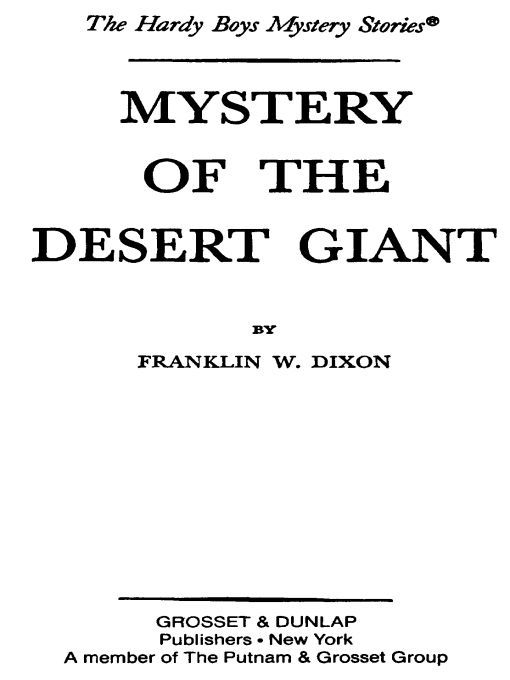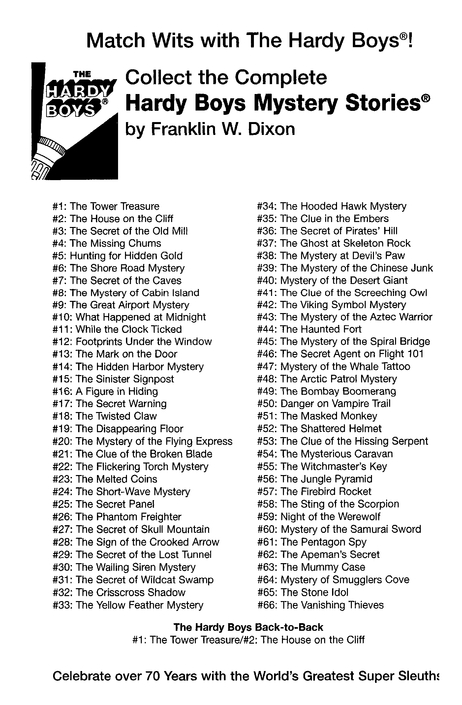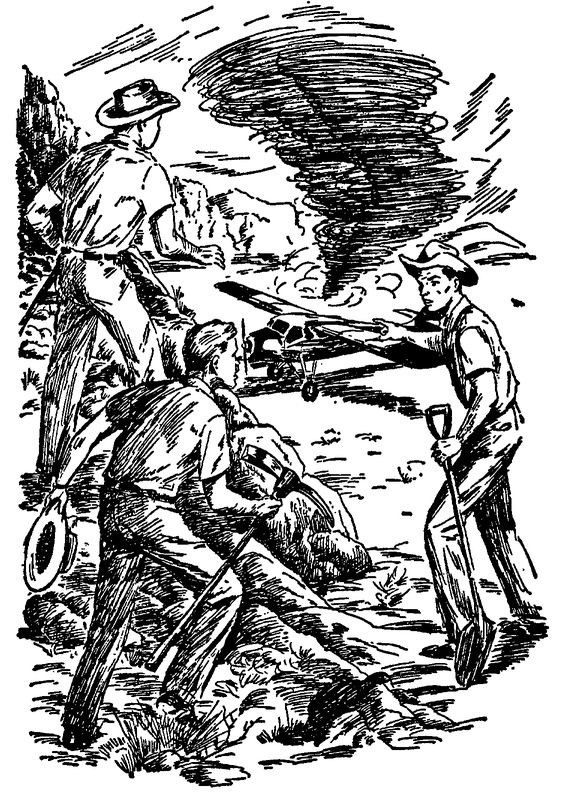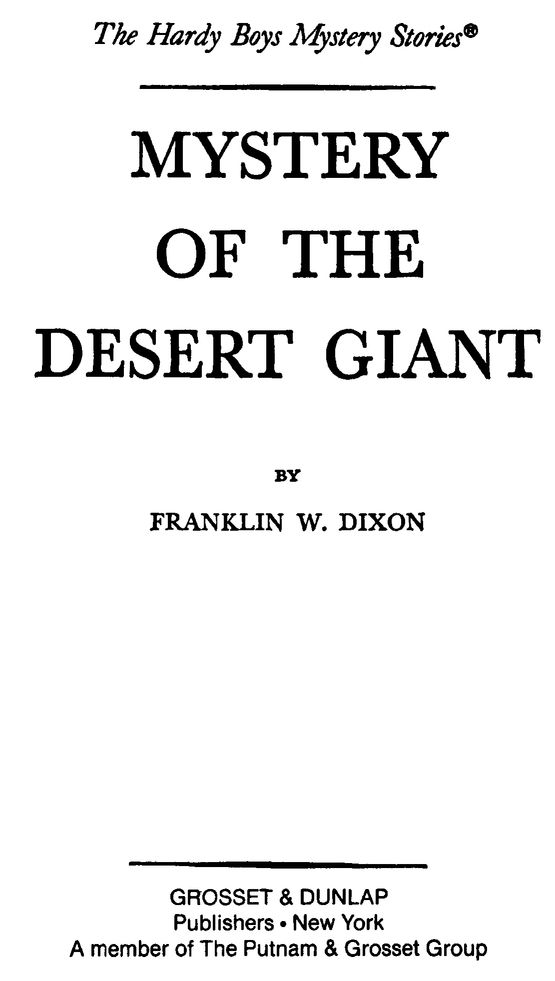Mystery of the Desert Giant
Read Mystery of the Desert Giant Online
Authors: Franklin W. Dixon


Table of Contents
Â
Â
Â


“That dust devil will wreck our plane!”

Copyright
©
1989, 1961 by Simon & Schuster, Inc. All rights reserved. All rights reserved.
©
1989, 1961 by Simon & Schuster, Inc. All rights reserved. All rights reserved.
Published by Grosset & Dunlap, Inc., a member of The Putnam &
Grosset Group, New York. Published simultaneously in Canada. S.A.
THE HARDY BOYS
®
is a registered trademark of Simon & Schuster, Inc.
GROSSET & DUNLAP is a trademark of Grosset & Dunlap, Inc.
Grosset Group, New York. Published simultaneously in Canada. S.A.
THE HARDY BOYS
®
is a registered trademark of Simon & Schuster, Inc.
GROSSET & DUNLAP is a trademark of Grosset & Dunlap, Inc.
eISBN : 978-1-101-07653-8
2008 Printing
CHAPTER I
Missing Airmen
“WHEN do you think this mysterious visitor is going to show up?” Chet Morton asked impatiently.
The chubby boy looked uncomfortable as he squatted behind a waist-high hedge. Chet's companions, Joe and Frank Hardy, who were experienced campers, rested easily upon their haunches.
“Can't say,” replied Frank Hardy in a low but distinct voice. “The person on the phone said to beware of the man who's calling at our house tonight. And he didn't give his name or that of the man who's coming here to see Dad.”
The trio had taken their positions shortly after dark. From their hiding places they commanded a view of the front walk of the Hardy home in Bayport.
“I checked with Mother and Aunt Gertrude. They aren't expecting anyone,” Joe Hardy said thoughtfully. “And Dad had an appointment on the other side of town tonightâ”
“But,” put in Frank, the older of the two brothers, “the man on the phone said the Hardys had better watch their step! That's why we want you to take a picture of him, Chet, with that new infrared camera of yours.”
“Here we go again,” the stout boy moaned. “Can't you Hardys solve your mysteries without me? All I ever get out of your cases is bruises!”
At that moment a sharp jab in the ribs by Joe alerted the others. The quick scrape of leather on concrete could be heard out front. Abruptly, the footsteps stopped.
Peering, the boys made out the indistinct figure of a man who had just turned into the Hardy walk. The man stood motionless for a moment, then the boys heard his footsteps dying away down High Street.
“Changed his mind,” commented Frank, puzzled. “What's going on here?”
“We'll find out! I got his picture!” Chet cried out.
“Hush!” Frank cautioned. “He may not have been
the
visitor.”
the
visitor.”
As he spoke, the boys heard more footsteps. This time they were the strong, confident steps of a man who entered the walk and strode purposefully toward the Hardys' front door. Simultaneously, Mr. Hardy's car turned into the driveway.
As Chet snapped the man's picture, Joe debated whether to tell his father immediately about the telephone message. He decided against it. Leaving now would give away their position and ruin the element of surprise.
“Let's go!” Frank Hardy signaled.
Abruptly the three boys broke through the hedge into the path of the astonished caller.
“Who
are you?” Chet burst out.
are you?” Chet burst out.
“Why, I'm Philip DodgeâI've come to see Mr. Fenton Hardy, the investigator. We have an appointment tonight.”
“I beg your pardon, Mr. Dodge,” Frank apologized. “We thought you might beâanother visitor.” He introduced himself and the others.
“We'll take you in to Dad,” Joe volunteered, leading the way. “He just arrived home.”
As Joe and the visitor entered the house, Frank whispered to Chet, “Why not develop your pictures while Dad talks to Mr. Dodge? The lab is open. I'm curious to see who our first visitor wasâI'm also wondering if Dodge is the man we were warned about.”
“Great idea!”
Carrying his camera, Chet disappeared around the house. He liked nothing better than to putter in the well-equipped laboratory the Hardy boys had built on the second floor of their garage. More than once the lab had been useful to them in their detective work.
Meanwhile, the brothers ushered their visitor into the comfortably furnished Hardy living room. In the light of the room the contrast between serious-minded Frank Hardy and impetuous Joe was apparent. Eighteen-year-old Frank was dark-haired and Joe, a year younger, fair-haired.
As their father greeted Mr. Dodge, whom he seemed to know well, the boys turned to go. Fenton Hardy, a tall, broad-shouldered man in his forties, held up his hand.
“Hold it, boys! No reason you shouldn't hear this. I've a hunch you'll find it interesting. You don't object, do you, Phil?”
“No. Of course not.”
Frank and Joe needed no second invitation. Mr. Hardy and his sons took seats, while Philip Dodge stood nervously by the fireplace. He was a well-dressed, middle-aged man.
“Fenton, I've never been so baffled in my life!” he burst out. “As a lawyer, I've had some odd cases. But this time I'm up against a brick wall!
“I have an office here in Bayport, boys. Not long ago a retired manufacturer, Clement H. Brownlee, came to me and asked if I would try to locate his nephew. It seems this nephew, Willard Grafton, had been a highly successful young industrialist in Los Angeles. About three months ago he disappeared!”
“How did he disappear?” Fenton Hardy asked.
“Well, he liked to fly his own plane on business trips around the country,” the lawyer resumed. “Three months ago he and a friend named Clifford Wetherby took off on a flight over the California desert, near the Colorado River. Since then, nobody has seen a trace of Willard Grafton or Clifford Wetherby!”
The visitor's bafflement was apparent as he paced up and down the room. In contrast, Fenton Hardy's manner was calm and professional.
“What about the plane? They don't usually just vanish, Phil.”
“The planeâoh, the plane was found all right. It had been landed, very neatly, too, on the desert near a bluff about sixteen miles north of the town of Blythe, California.”
“Anything wrong with the plane?” Joe asked.
“Low on fuel, but not damaged otherwise. That's what really baffles me. It looks as if Grafton set his ship down on that desert deliberately.”
“Grafton and Wetherby must have walked away,” Joe stated. “But where?”
“There wasn't a trace showing where they went or what had happened,” Mr. Dodge said.
“You've notified the local police, of course, and have had the area searched thoroughly?” Mr. Hardy queried.
“Oh, yes, Mr. Brownlee saw to that before he consulted me. No results. No evidence that the men had died, and no leads to their whereabouts. The Air Force even supplied an Air Rescue team to help in the search, but nothing turned up. I went out there and flew over the area myself last week, but I didn't learn anything, either.”
While Philip Dodge was speaking, Frank Hardy sat quietly in his chair. Something in the lawyer's story jogged his memory. “You say this plane was landed in the desert above Blythe, California? Near the Colorado River?”
“That's right.”
“Shall I tell you what I think you saw below you?”
“All rightâshoot.”
“You saw giants on the desert. Giants better than a hundred feet tall.”
“Giants!” burst from the bewildered Joe Hardy and his father.
“You guessed it, Frank.” Mr. Dodge chuckled. Fenton Hardy looked from his visitor to his elder son. “This sounds a little like a private joke.”
Philip Dodge laughed. “Maybe you'd better explain, Frank. By the way, how did you know?”
“The name Blythe stuck in my mind,” the young man admitted. “Joe and I read a lot when we're not busy on a case. Some time last year I came across information on the desert giants.
“As I understand it, a few hundred years ago the Indians around the California-Arizona border drew a number of huge pictures on the desert surfaces. The giant on the Arizona side of the Colorado River opposite Blythe, California, is one of the biggest of all.”
Joe Hardy laughed. “Whew! What kind of pencil do you use to draw pictures that size?”
“The Indians scraped away the surface gravel in very shallow furrows. The hard soil underneath gave them distinct tan-colored lines for their pictures.”
“It doesn't make much sense to me,” Joe objected. “The Indians drew pictures better than a hundred feet tall on the desert. What for? How could they even see their pictures, once they were drawn?”
“I guess that's a mystery in itself,” Philip Dodge commented.
But suddenly Frank broke in once more.
“Joe's got something!” he announced. “It's true, the only way to see the desert giants is from the air. The Indians couldn't see them, but
we can!”
we can!”
Other books
Roommates (Soulmates #1) by Hazel Kelly
His Christmas Wish by Andi Anderson
A Death in Sweden by Wignall, Kevin
The Devil's Wire by Rogers, Deborah
The Good Vibrations Guide to Sex by Cathy Winks, Anne Semans
The Collector by Victoria Scott
Return of the High Fae (Vegas Fae Story Book 1) by Tom Keller
Honey, Baby, Sweetheart by Deb Caletti
OBSESSED WITH TAYLOR JAMES by Toye Lawson Brown